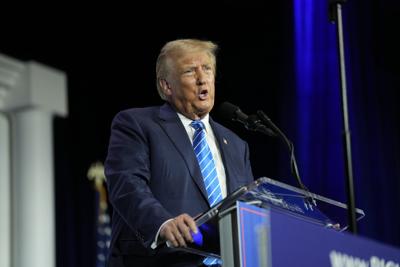A Louisiana judge dismissed a legal challenge to Donald Trump's 2024 presidential candidacy Friday after the Chalmette woman who filed the lawsuit acknowledged in a hearing that it contained multiple disqualifying errors.
Ashley Reeb had argued in her December lawsuit that Trump should not be permitted as a candidate in the 2024 primary because of his role in the Jan. 6, 2021 raid on the U.S. Capitol, actions that led to his impeachment by the U.S. House of Representatives on insurrection charges. Trump was acquitted by the Senate.
Reeb's suit mirrored similar cases brought in numerous other states. But she said Friday that after filing, she learned she lacked the legal grounds to bring the action because she wasn't a registered Republican when she filed it, and Louisiana's primaries are closed for presidential elections.
Reeb also failed to serve court papers to Trump directly, she said, which she attributed to a miscommunication with the state elections office.
"There was just no way forward," said Reeb, who added that she has since registered as a Republican. "It just didn’t make any sense to try to pursue something."
Reeb, who filed the lawsuit herself, said she couldn't afford an attorney. It's past a deadline to file another challenge in the primary, but Reeb said she hasn't ruled out later filing a challenge to Trump's candidacy in the general election.
The dismissal of Reeb's suit Friday by Judge Kelly Balfour, of the 19th Judicial District in East Baton Rouge Parish, was first reported by LaPolitics Weekly.
The suit was filed in Baton Rouge because it named Louisiana Secretary of State Kyle Ardoin, who administers the state's elections, as the defendant.
Similar challenges to Trump's candidacy have been filed in at least 17 other states to date, according to a tally by The New York Times.
So far, only Colorado and Maine have declared Trump ineligible; Colorado through a state Supreme Court decision and Maine through a ruling by its secretary of state.
Trump has appealed both decisions. On Friday, the U.S. Supreme Court agreed to hear the Colorado case.


